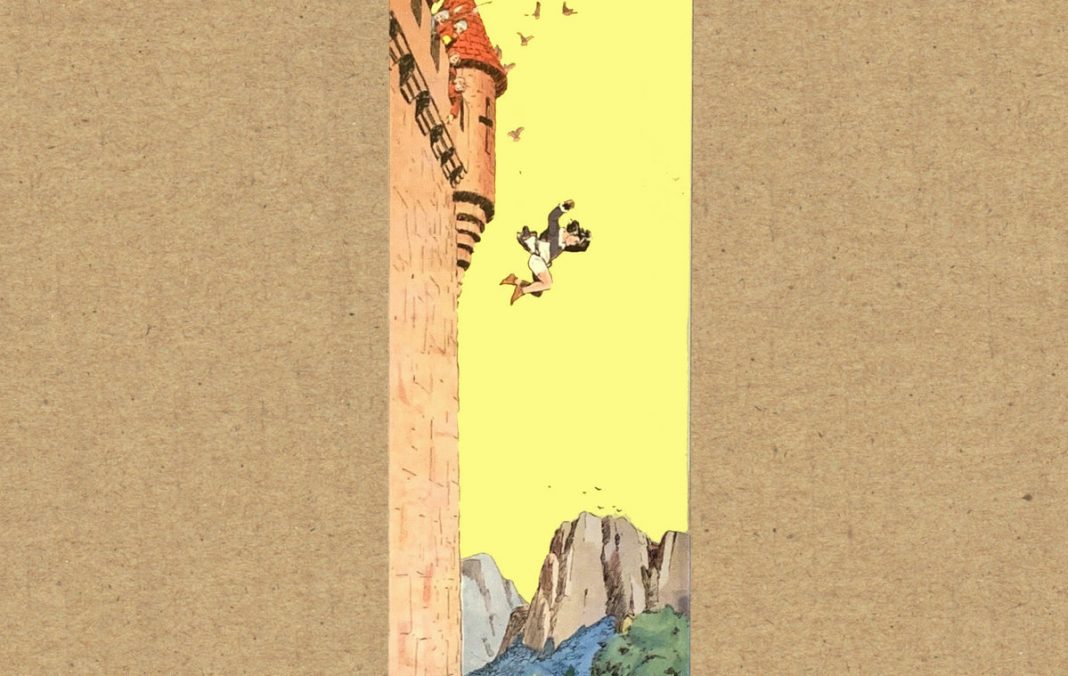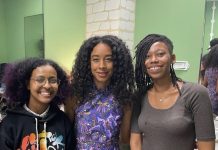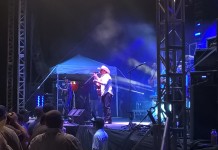Amanda Maceda: With me right now is Matthew Devil—
Matthew Devil: Hello.
AM: Who just released a new album a little earlier this month
MD: That’s right. It’s called (Un)valiant and it came out on the 21st. It’s very exciting.
AM: Very. I mean, since it’s like…since you released that it was coming out, a lot of the local music scene has been excited about it. Ya know, finally: (Un)valiant.
MD: Yeah. I’m very glad that some people were paying attention. I was just worried that it was going to come out and no one would hear it or even realize it was there. Thankfully, I did a good enough job with the promo. I have enough people telling me that it’s good, so I got that validation.
AM: It is great.
MD: Thank you.
AM: I will just sprinkle all the validation right now.
MD: Thank you.
AM: So, you did answer a few questions in the latest Pseudo Stereo that happened last Friday—
MD: Yes—
AM: With Jonathan [Stewart]…and this project, the songs on here kind of span a series of years—
MD: Yeah…a lot of the songs have been in many different forms over the years, and I think the oldest one…I created the project on my computer probably in 2016, so it’s been a lot of different iterations of just me deciding what I want it to sound like and after I decided the whole concept that I wanted this album to be about and this narrative sort of thing, I took the songs I was working on and kind of tweaked them and adjusted them to fit this whole story so it created a nice flow. And I really like how it turned out because some of the songs, especially like “Parapets of Doubt” was a completely different song. I think it was twice as long, it was just not even related to anything. There were no words, it was just a drone. But yeah, all the songs have certainly evolved over a long period of time. And I’m glad I took that much time with it because a lot of the time, I just churn stuff out without really thinking about it because I’m worried that I’ll get stuck with it. But this time, I finally just kind of sat with it and kept working on it until I knew it was where I wanted it to be.
AM: Yeah, that sounds great. I mean…especially having that time to kind of look back at the sound and be able to morph it—
MD: For sure, yeah.
AM: But you said…you mentioned how you were getting some of these to fit around a narrative. And what really got me with this album was like, I guess specifically was like some of my own music tastes, was that I really love narrative, conceptual albums.
MD: I do too, and that’s why it’s hard for me to write because, certainly there are a lot of great albums that don’t have a theme that ties them together. It’s just a nice collection of tracks. But for me, it’s difficult to…I’ve always found it difficult to go into an album-writing process and not have it all…coherent because I want…because it just feels random to bring a bunch of tracks together that aren’t related. So yeah, and of course I’m inspired by a lot of concept albums, so that’s why I wanted to…I really like the album as an experience, so I wanted to craft something that you could truly…something that you could listen to front to back as opposed to kind of skipping around. Well, you can certainly still do that because the songs are good on their own, but you know what I mean.
AM: Yeah, I agree. I mean all of these, in my opinion, are strong, independent pieces—
MD: Yeah—
AM: But they do work very well together to create this almost audio narrative—
MD: Yep. Thank you.
AM: And especially once the listener, like, gets to the outerlude that you had—
MD: Yeeeahhh.
AM: You know, almost like kind of full circle. Almost like what happens in movies sometimes where you realize that what happened at the beginning is coming back and they’re connecting more than you thought they would
MD: Yeah…that was pretty much the intention. And actually, I put that…I wrote that story about halfway through the process of putting the album together and having all the tracks. Originally, I put that in the middle just to kind of act as like a benchmark to see where the listener is and where it’s going, but it made sense to put it closer to the end because I wanted to foster this sense of being transported to another world where the…what information you’re getting isn’t necessarily clear and I like how the outerlude towards the end kind of fills in the gaps and like answers questions. And if you notice, if you read it, it mentions all the song titles so you can tell where each piece of the puzzle fits into the story. So yeah, that was the very heart of the album that I really deliberated over for a long time because I just wanted it to…I didn’t want to sound like ham-fisted like I was just handing you a story on a plate. I also kind of wanted it to…I wanted it to make sense that it was coming up here and like answering questions that the listener might have about what I’m singing about. So, yeah, I really like how it turned out, and I’m really glad that you made that connection because yeah, it kind of does feel like cinematic in a way.
AM: I mean, like the way that you decided on the final placement, you know, in my opinion, it helps…the listener unravel the story themselves but then this supplemental to support that—
MD: Exactly.
AM: And yeah, very much because this is a narrative…album and it’s very much built on this conceptual framework. It’s very…just very much I appreciate the lyrics for all the songs that do have lyrics
MD: Yeah, I thought…I went back and forth on rather I wanted the lyrics to be as…like a focal point because usually, I…like my previous list of lyrics aren’t as big of a deal to me. I generally like to focus on the sound. That’s why I’m really into…that’s why a lot of these songs started as instrumental songs. But lyrics just kind of came about as I was writing the album, and they kind of came to me, so I felt like I wanted to lean in to that. And giving myself the challenge, with this album, of not including any songs or lyrics that referred to me in the first person. I wanted it to be about a character who was separate from me. That gave me a lot of creative, like, inspiration. I was able to come up with things that sounded a little bit more poetic than I typically am predisposed to doing because it’s really easy to write songs like “I’m feeling this way…,” “I don’t want this…” I…it’s hard to go a day without hearing a song that talks about…where the singer is singing about themselves, so I used that sort of challenge to see if I could write about something a little more interesting. And I just think it was mostly a success [chuckle] even though it is an autobiographical study to some extent; it’s just the parable that is spoken about it is inspired by my own life, but I really liked the idea of pulling it out and turning it into a cautionary tale that can be interpreted in many different ways. And the lyrics are vague, but I liked having them written out because that makes it easier for the listener to form their own interpretation of it and just kind of dive deeper. Which, I really like going deep and analytical when listening to albums.
AM: Yeah, exactly.
MD: Yeah.
AM: Yeah. Like especially when it comes to albums like this. Having the lyrics there…there are a good amount of music fans who just love annotating songs—
MD: Yeah, exactly.
AM: So I can imagine people doing the same with…and have a good right to do so because there is a lot of stuff that you can take from it and even connect to your own life. When it comes to terms of creative writing, you were right in the fact that there are so many songs out there that use a lot of first person or a lot of second person.
MD: Yeah, they’re either talking about themselves or talking to you.
AM: Mmhmm. And it’s too…they do it to establish a connection and try to make that relation when people are singing it back to them
MD: Yeah, no, exactly.
AM: Going into the artists’ shoes, but you can do that just as much by adding, you know, specific characteristics and like life to like a third person as a character, and I feel like you executed that very well with this. You know?
MD: Yeah, I think that was one of the best things that I found out through this kind of challenge that I set for myself because I’m more…it made me realize that there is more than one way to establish a connection with the listener instead of just talking directly to them. It was able for me to be a bit more colorful with the words that I chose a little bit more metaphorical so that the interpretations of the story that I paint with the lyrics can be a little bit more, you know, open so that people can read into them what they like. And what you said earlier about people like annotating, I’m very…that’s something that I’m usually not very interested in doing. Usually, I’m more of a sound-focused listener I feel like. I listen to a lot of music that I like for…how they sound and how they make me feel instead of what the lyrics say to me. That’s certainly not the case with all the music that I listen to, of course, but at least with music that inspires me and my own art, I’m certainly more inspired by sounds and how people use sound to affect emotion in a listener. Yeah, that was sort of a challenge as well: I wanted to put more focus on the lyric, like I wasn’t just filling space with words, you know what I mean?
AM: Mmhmm. Like they had their weight in them in reference…along with the music.
MD: Exactly. And the concept really helped out because it gave me a purpose for the lyrics. It kind of gave me a direction that I wanted it to go in.
AM: And in terms of, like, the core concept itself, you said you wrote the “Parable Outerlude” all by yourself?
MD: Ah, yes. I had a little bit of input from friends, but yes, I did pretty much write it myself. It was inspired by a multitude of many different things. Originally, I had written it in a completely different kind of literary voice because obviously in the final version, it was just in plain English kind of stating what was going on. But in the original version that I was going to put in the middle of the album, I was very much inspired by the writing that David Mitchell does in his book, Cloud Atlas. There’s this one…it’s a book set in—
AM: Yeah, yeah. I know that book.
MD: Yeah, it’s a fantastic book, but his…it’s written in six different timelines and the sixth one that’s in the farthest future is like, it takes place about 200 years in the future, it’s written in sort of this Pidgin form of English that’s kind of mangled and bastardized and kind of has a different kind of feel to it. There’s lots of, you know, apostrophes and loaned words from other languages thrown in there, and it just kind of sounds like further evolved past our version of English. So, I wrote the parable originally in that voice that kind of sounded like that. But the way that I executed it in the original version of this parable thing…it made the…like…when I would play test it to people or I would have friends listen to it, it felt much more opaque, like you couldn’t quite understand what I was getting at. Like kind of like a wall between the listener and the story. So that’s why I decided to rewrite it in a more…kind of a more plain English way. And I think it was a better choice in the end, but yeah, I think it was a neat idea. The story itself was all me besides the inspiration for the album cover or like the picture that I used for the album cover because I liked the idea of parapets and jumping from them as a metaphor for, like, courage and taking a leap of faith. How I was relaying that my own experiences as someone with anxiety and self-doubt and things like that…was this…I wanted to write a story about, like, someone who let that anxiety and self-doubt consume them like they were being trapped in a castle and ultimately not being able to escape that building and having everything crash around them because the anxiety can act as sort of a virus that affects everything around so that’s ultimately what the story is. I just really liked that imagery of kind of like a medieval setting, but relating that to something that is very much like a modern dilemma for people my age, I think.
AM: Yeah, for sure. When you mentioned it the first time a few days ago that this related to anxiety, it hit different because I didn’t [laughs]
MD: Yeah [laughs]
AM: I was like, “oh.”
MD: Yeah, I guess it’s not super…I’m not necessarily saying outright in any of the songs that I’m being anxious or anything, but I think…when you read into the lyrics, it’s easy to tell that it’s about relationships and like connections. But yeah, the story’s about those connections being tattered or ruined or soiled because of self-doubt and questioning yourself and, you know, not having the courage or the valiance, if you will. So, it is kind of ambiguous how you interpret that. But it is ultimately about anxiety and how you interact with others or how I interact with others I guess since it’s mostly about me [chuckles]
AM: Yeah. Because you know, it was based off how you feel and anxiety does affect people differently. Even when it comes to, like, how it affects people’s bodies and how they react—
MD: Absolutely, yeah. It manifests in many different ways.
AM: Looking back, some of these, like, you know, they think differently when thinking in that lens. It can be almost debilitating or fearful to go through that when you’re in an anxious state—
MD: Yeah.
AM: From experience, the idea that this castle…that you’re kind of building up these walls. I know that it was really powerful.
MD: And furthermore, you know, when I imagined myself…when I’m in a state where I’m feeling anxious or I’m feeling paralyzed by indecision, which is something that I deal with a lot, it can often feel like I’m just wandering the halls of this gigantic castle that I can’t find my way out of. And I’m just kind of stuck, so that’s…that was an image that I used in the parable: walking the corridors of your mental prison or whatever I said. And yeah, that’s ultimately the quest of the protagonist: they’re trying to find that window on the parapet where they can jump out and face their fears, but…yeah…that’s why a castle’s very useful, I think, in getting across this sort of story.
AM: And then almost in connection to like the way you edited the way you wrote the parable, it almost gave me this almost, you know, fairy-tale vibes to the whole thing
MD: Yeah, exactly. It’s supposed to be like a legend—
AM: Like traditional—
MD: And that’s why I wrote it in that, like, evolved form of English originally. Because I want to feel like it’s a story being passed down through generations because it’s kind of like…I call it a parable because it’s like…if you hear of a parable in the Bible, it’s supposed to be teaching you something, you know? It’s supposed to be like…divulging into this one aspect of the human condition that we can try to…and we use the story to kind of figure it out for ourselves. So that’s why I refer to it as a parable or like a fable because it’s supposed to be…I wrote it to help myself work through this, you know, and try to understand it more. So, yeah.
AM: I know that we’ve gone over time, so I think that part of this is just going to go in the blog and part of this will go into the Mercury, but I did wanna end with just kind of one more question…more of just an opinion: how do you feel about the castlecore/castlewave label that’s been bestowed upon you?
MD: Oh, well, the thing is that I bestowed it upon myself. I kind of just made it up [laughs]
AM: Oh, okay.
MD: That wasn’t Jonathan’s idea. Basically, I was—
AM: I thought it was yours—
MD: Yeah, it was mine. The only reason that I came up with that was because I was searching…because the thing about this album sonically—that’s dealing with the sound—because I know we’ve been talking about the lyrics most of the time, but the sound of it, I was…the challenge to myself was that I wanted to create a sound that I hadn’t heard before…or at least a mixture of sounds that I hadn’t heard before. So, ultimately, what I came up with was this ambient/electronic soundscape work melding with more acoustic/folk/singer-songwriter material. I was just searching on Bandcamp to see if anyone else had done this, and I came up with word “castlewave” because it sounds like something that this music would kind of embody. It’s kind of related to vaporwave in the sense that it’s mostly an electronic genre that benefits from nostalgia and the idea of being transported to another place when you hear it. So, it’s kind of that but it’s also a recontextualization of that term because…since it’s castlewave, it’s putting you in a different place than…that’s what the wave suffix does for me. It indicates that you’re being taken someplace else. That’s why I came up with that word. I feel like that’s the most succinct way to put what the sound the album is. And I just like the sound of being a pioneer, something new [laughs] that’s why I came up with that term.
AM: It fits, I think it fits, and I think a lot of people agree as well that have gotten to listen to this album.
MD: Yeah, and I’m glad that some people are latching onto it because it’s really cool. I think it’s beneficial to always be furthering our language when we talk about this sort of thing; when you try to describe a sound, it can be helpful to use descriptors, so yeah.
AM: Yeah, for sure. I guess I’m gonna add another question onto here: when it comes to future endeavors, will you, like, consider making more conceptual stuff, or do you wanna go back to more on the sound-based aspects of creating?
MD: It’s gonna be a mixture of both. On the thematic side, I can’t really steer away from doing the conceptual stuff. I can almost guarantee that the next project I put out, it’s gonna be built around some kind of theme or concept. It probably won’t be like a story album, really, in the way that this one was, but it’ll certainly…all the songs will be revolving around a central idea. So, I doubt that I’m gonna move away from that approach any time soon. But I definitely think that this sound, there’s a lot more room to explore. So, I definitely want to kind of play and continue to evolve the sound. So, I can’t guarantee that it’s gonna sound exactly like this album, but it’s just gonna be…I’m gonna keep trying to move forward and not stay in the same place. Yeah, I think that there’s a lot more that I can try and explore. And that’s what’s exciting about it.
AM: Yeah, it’s like new terrain—literally new music terrain.
MD: Yeah, I like being an explorer with sound. That’s my mission.
AM: Well, I wish you all the good luck and the safety, that you find some awesome discoveries as you adventure into new sounds.
MD: Thank you very much. I’m very excited and thank you so much for giving the album the attention and thought it wants. I’m very thankful to everyone for listening to it. Thank you so much.
AM: Truly our pleasure. Where can the people listening or reading this interview…what’s the best way for them to find either your music, or contact you, or connect on socials?
MD: Yeah, I try to make it pretty easy to find me. Obviously, all the music is at matthewdevil.bandcamp.com. If you search for it on your streaming services, it should be there. And on social media, pretty much on every social media, I’m just matthew_devil_. So that’s Twitter, Instagram. On Facebook, if you just search Matthew Devil, it’s there. Hopefully, that’s easy enough to remember.
AM: Again, just thank you so much for carving out some time in your schedule to do this little interview with us here at Radio UTD.
MD: Of course. Much love to Radio UTD forever.
AM: Awwwww.
Listen to the album here:













